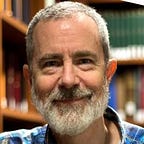Exploring the Limits of Doubt
How Paul’s conversion experience can help us ask the right questions about faith
One of the ideas that I explore in my book (Between Faith and Doubt) is the Apostle Paul’s use of Old Testament Scripture to build his theology in the New Testament. As much as I have issues with the liberties that he takes with his interpretation of Old Testament texts, one thing I admire about the Bible’s portrayal of Paul is the complete and dramatic turn-around of his life as described in the book of Acts.
In his pre-conversion state, Paul is without doubt as hostile as anyone could possibly be toward the new “way of faith” that had come into existence just before his appearance on the scene. Paul is first introduced (by the name of Saul, his pre-conversion name) as one who was “giving his approval to” the stoning of Stephen, a devout follower of Jesus — an event that kicked off the massive persecution of Christianity that followed.
In his letter to the Philippians (chapter 3), Paul talks about how he was well-known and respected in his pre-conversion state for his strict adherence to Jewish customs; his depth of knowledge of Jewish law; his upstanding position in Jewish society; and most of all, for his zeal in persecuting the church, all of which qualified him as an upstanding and respected figure in the Jewish community.
With his conversion experience, equal in its spectacle to his pre-conversion portrayal, he is very soon regarded as possessing a depth of knowledge of Christianity, an unwavering faith, and total submission to Jesus. In short, Paul serves as an excellent example of faithlessness, rebellion, unbelief almost instantly turned upside down to take on the very opposites of those characteristics through a dramatic conversion experience.
Paul was as committed to following the requirements of his newly adopted Christian faith zealously, with the same level of radicalism that he devoted to his Judaism.
What does that summary of the life and experience of Paul teach us? Perhaps simply this — that unbelief, doubt, and rebellion toward God, if treated seriously and not rejected as an anomaly to be cut short, quickly overcome and forgotten, can be used in a transformative way that is more powerful than a typical and undramatic conversion experience. As is clearly demonstrated by Paul’s life, his standing as a follower of the new Christian faith is regarded as credible and serious BECAUSE of (not in spite of) his reputation as a committed and violent persecutor of the same faith that he now embraced.
However one thinks about the influences that prompted Paul to change his mind in such dramatic fashion, one can’t help but think that there must have been real conflict in the heart of Paul for him to suddenly abandon all of his prior religious assurances and turn toward the new revelation that he received by his “blinding” experience on the road to Damascus.
That idea prompts some basic questions:
1. What (if any) are the benefits of following one’s inclination to explore the limits of unbelief?
2. What are the benefits and the liabilities of blindly following an inherited faith tradition, even when that tradition ceases to appeal to the heart?
3. What are the benefits and the liabilities of blindly following a new faith tradition, even when that tradition doesn’t appeal to the intellect?
As I’ve been careful to point out (and will continue to do so), I don’t pretend to have settled on answers to these kinds of questions. But I also want to be honest enough to take notice of stories like the story of Paul’s dramatic conversion, and explore questions that such a convincing story bring to the surface.
As rational beings, it shouldn’t be impossible to distinguish between serious and credible accounts like that of Paul, and an account that defies all logic but appeals to one’s base sensibilities. I don’t pretend to be qualified to judge between the two, but I find it (increasingly as time goes on) a safe place to be to always be in the posture of questioning.
